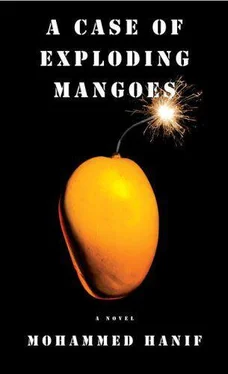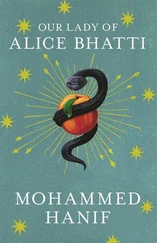The First Lady wasn’t getting the sisterly support she had expected from the other women in the queue. “Begums like her bring us a bad name,” the woman in front of the First Lady whispered to the woman ahead of her, making sure that the First Lady could hear. “Look at all the gold this cow is wearing,” the woman said, raising her voice. “Her husband probably died trying to keep her decked out in all that finery.”
The First Lady pulled her dupatta even further over her head. She tightened it across her chest in a belated attempt to hide her necklace.
Then she realised that to these women she must appear a fraud, a rich begum pretending to be a widow coming to feed off the official charity.
“My husband is not dead,” she said, raising her voice to the point where ten women in front of her could hear. The women turned round and looked at her. “But I have left him. And here, you can have these.” She removed her earrings and unhooked her necklace and pressed them both into the reluctant hands of two women standing in front of her.
The whisper travelled along the queue that a woman at the back was distributing gold.
General Zia’s right eye noticed the pandemonium at the back of the queue. With his left eye he sought out the Information Minister. He wanted to find out what was happening, but the minister was standing in front of the backdrop as if guarding the last bunker on a front line under attack.
An incredibly young woman, barely out of her twenties, shunned the envelope extended towards her by Zia, and instead removed the dupatta from her head and unfurled it like a banner before the camera.
Free Blind Zainab , it read.
General Zia shuffled back, Brigadier TM rushed forward with his right hand ready to draw his gun. The television cameras cut to a close-up of the shouting woman.
“I am not a widow,” she was shouting over and over again. “I don’t want your money. I want you to immediately release that poor blind woman.”
“We have set up special schools for the blind people. I have started a special fund for the special people,” General Zia mumbled.
“I don’t want your charity. I want justice for Zainab, blind Zainab. Is it her fault that she can’t recognise her attackers?”
General Zia glanced back and his right eyebrow asked the Information Minister where the hell he had got this widow. The Information Minister stood his ground; imagining the camera was taking his close-up, his mouth broke into a grin. He shook his head, and composed a picture caption for tomorrow’s papers: The President sharing a light moment with the Information Minister .
Brigadier TM could stand disorder at one end of the queue, but now there were women wagging fingers and shouting at both ends, those furthest from him cursing the last woman in the queue and this one right in front of him defying presidential protocol. He took out his revolver and moved towards the cameraman.
“Stop filming.”
“This is good, lively footage,” the cameraman said, his eye still glued to the camera. Then he felt something hard poking his ribs and switched off the camera.
Brigadier TM had the protesting woman removed and the ceremony started again, this time without the television camera. General Zia’s movements became mechanical, he barely looked at the women when they stepped forward to receive their envelopes. He even ignored their blessings. If his enemies had infiltrated his saviour angels, he was thinking, how could he trust anyone?
By the time the last woman in the queue stepped forward to receive her envelope, General Zia was already turning towards his Information Minister. He wanted to give him a piece of his mind. General Zia extended the envelope towards the woman without looking at her; the woman held his hand and pressed a small metallic ring into it. He only turned to look when he heard the sound of glass breaking.
His wife was standing there striking her glass-bangled wrists against each other, something that women only did when they heard the news of their husband’s death.
Later she would listen patiently as General Zia blamed his enemies in the press, pleaded national interest and invoked their thirty-eight years together. He would say everything the First Lady had thought he would. She would agree to continue to do her ceremonial duties as the First Lady, she would appear at the state ceremonies and she would entertain other first ladies, but only after kicking him out of their bedroom.
But here at this moment, she only said one thing before walking off. “Add my name to that list of widows. You are dead for me.”
The soldier escorting me back from the torture chamber unties my hands, doesn’t bother to remove my blindfold, holds my neck down with one hand, puts his boot on my buttocks and shoves me into a room. I land face down, my tongue tastes sand. The door that shuts behind me is small. I am relieved to notice that I am not in the bathroom where I spent the night. I fumble with the rag covering my eyes, the knot is too tight. I yank it down and it hangs around my neck like a poor man’s dog collar. My eyes blink and blink again but don’t register anything. I open them wide, I narrow them. I don’t see a thing. Have I gone completely blind? I stand still, scared to move my hands and feet, scared to find myself in a grave. I breathe, and the air smells of a duvet that has spent a night out in a monsoon, but it’s better than last night’s stench. Tentatively, I move my right hand, stretch out my arm. It doesn’t touch anything. I stretch out my left hand; it flails in a vacuum. I stretch my arms to the front, to the back, I make a three-hundred-and-sixty-degree turn with my arms outstretched, they don’t come in contact with anything. I keep my hand in front of me and walk, counting my steps. Ten steps and my hand scrapes a brick surface. I run my hand over the slim, flat bricks that the Mughals used to build this fort. Conclusion: I am still in the Fort. I am in a part of the Fort which is not an extension built by the army. I move left. Twelve steps and I run into another specimen of Mughal masonry. I knock on the wall, and as I should have known, there is only the dead sound of my knuckles against a historical monument.
I am not in a grave. I have ample space, I can breathe. I am in a luxury-sized dungeon. My eyes adjust to the dark, but they still can’t see anything. The darkness just grows darker. It’s the kind of darkness which is ancient, manufactured by the sadistic imagination of the Mughals. Those buggers may have lost their empire but they knew how to build dungeons. I go down on my knees and embark on a crawling tour of my abode. The sand is real sand, beneath it the floor, endless cold slabs of stone. Anyone planning to dig a tunnel here would need to hire a mining company. In this monument to sixteenth-century architectural values, the only concession to modern times is a plastic bucket in a corner that I butt my head against. It probably hasn’t been used in a long time, but the stale smell that emanates from it makes it absolutely clear that I shouldn’t expect any visits to a loo.
I sit with my back to the wall and shut my eyes, hoping the darkness will get less dark, the way it does in a cinema. I open them again. This place is no cinema. I can’t even muster any imaginary shadows.
Minutes pass, hours pass. How should I know how long I have been here? If I stay still I’ll lose my eyesight or parts of my brains and probably the use of my limbs. I jump up in panic. On your feet, Mr Shigri, get busy. I command myself to run. I run on the spot for a while, my body warms up. I keep my mouth shut and concentrate on breathing through my nose. Not a good choice of exercise, as I realise I am breathing in sand from the floor which has begun to fly in the air. I stop. I put my hands behind my neck and sit on my toes and start doing frantic squats. I do five hundred and without a pause jump in the air and land with my hands on the sand, body parallel to the ground. One hundred push-ups; a thin film of perspiration is covering my body, and an inner glow brings a smile to my face. As I sit back with my back to the wall I think that Obaid could probably write an article about this, send it to Reader’s Digest and fulfil his dream of getting one hundred dollars in the mail: ‘Aerobics for Solitary Prisoners’.
Читать дальше












